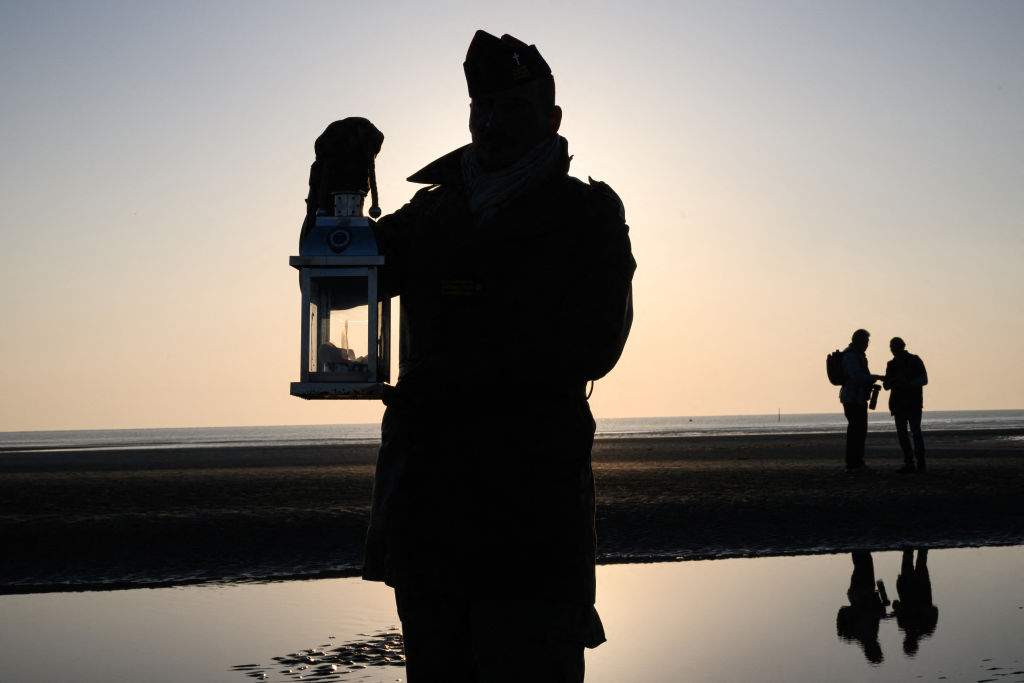In the town of Sainte-Mère-Église, just inland of Utah Beach on the coast of Normandy, a crowd had gathered before an outdoor projector to watch the British, French and American heads of state pay respects to those who served and the thousands who gave their lives on D-Day. While the dancing and drinking and celebration of the town’s 80 years of liberation went on around me, I was caught off guard by the small, dignified faces of the veterans’ broadcast on screen.
Watching the royals, Sunak, President Biden and President Macron lean down to shake the weathered hands of veterans in wheelchairs, I saw them, for a moment, as leaders whose first duty is to serve with humility and devotion. I felt much less sentimental after news broke later that evening of Rishi Sunak’s early departure from France for an ITV interview.
Sunak urged his opponents not to politicise his absence. Obviously they did, considering it felt political enough on his end, putting his campaigning before the evening memorial at Omaha Beach. The D-Day coverage back home quickly turned into another tedious election battlefront, shifting its attention towards the prime minister, descending into absurdity as Nigel Farage accused him of not believing in Britain, its history or its culture.
The shame is that Sunak, whatever his personal sentiments, squandered the opportunity to bring people in Britain – especially the young, whom he senses have lost pride in their country and its military – into a richer appreciation of that greatest generation. Instead they have become little more than the backdrop to a political scandal. It was possibly the last opportunity of this kind for any leader, as these celebrations take place only once every five years, and the youngest D-Day veteran is now 96.
I grew up in a US Army family, and still decades and peacetime have distanced me from the courage and sacrifice that D-Day demanded. Though the men and women my father served beside were prepared to make that sacrifice again, I saw them as ordinary: uniformed strangers in the supermarket, neighbours, friends’ parents, Dad. For those who grew up in civilian families, I imagine this distance is even greater.
I spent six years of my childhood at Fort Campbell, Kentucky, home to the 101st Airborne Division who parachuted into France around midnight on D-Day, clearing the way for the infantry landing at Utah. Their ‘Screaming Eagles’ insignia was present everywhere at Fort Campbell – from the gates leading onto the base, to the patches I saw on soldiers’ arms as they picked their children up from school, to the banners in our gymnasium. Yet it wasn’t until I saw it flying all over Sainte-Mère-Église that I understood the heroism it represented – flying into the darkness, landing in this German-occupied town, having their ‘rendezvous with destiny.’
Sainte-Mère-Église was the first town liberated during the Battle of Normandy – a memorial here marks kilometer zero on the path to freedom. In the town’s church, a stained glass window depicts Saint Michael, patron saint of soldiers, with sword and shield against a backdrop of parachutes. Beneath the window, the words ‘IN TERRA PAX’ are written on the memorial organ dedicated to the victims of the second world war. Re-enactors sat in the pews, seeking a place to cool down in their khakis and boots, possibly to pray. What these soldiers died for was not just honourable but holy: peace on earth, freedom.
Later, from the ramparts of Le Mont-Saint-Michel, I watched paratroopers jump from A400Ms down to the tidal flats. The British Red Devils flew down with a massive Union Jack and the American Golden Knights with their Stars and Stripes, almost comical in size (a fellow Yank shouts, ‘Murica!’). It’s for show, yes, but these soldiers know their sport prepares them for the possibility of real air assault. A young American around my age stood next to me and my father. He asked, ‘Is there some kind of big event going on?’
Soon, D-Day will pass out of living memory. As that hour approaches, we lose touch with the past and begin to doubt the virtue in patriotism. This has been true throughout history – that peace brings complacency. But the solemnity of that promise following the second world war, of ‘never again’, is unique in history, as does the magnitude of sacrifice and the respect we will always owe those who served.







Comments